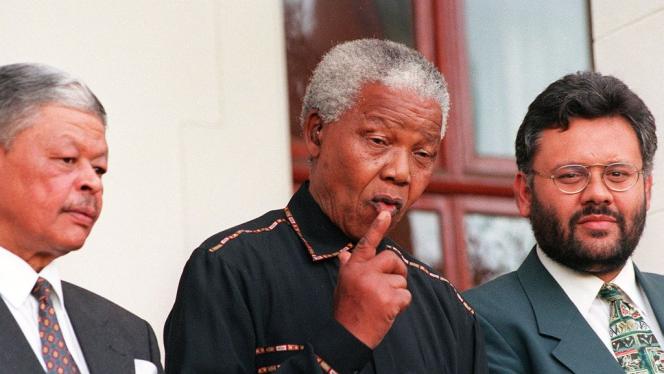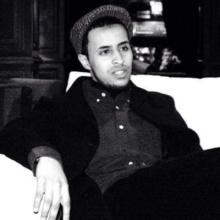Thursday 21 November 2024
What Palestine means for South Africa: Former ANC veteran reflects on ICJ case and Gaza

South Africa’s decision to take Israel to the ICJ on charges of genocide could cost his country, says former South African ambassador and anti-apartheid activist Ebrahim Rasool, but is an act of “enormous integrity”
When Ebrahim Rasool was growing up in South Africa, the white minority government enforced a strict and brutal apartheid system. One of his earliest memories of the pervasive structural violence experienced daily by people of colour was in 1972, when his family's neighbourhood was designated a "white" area. This policy, known as "forced removal," involved clearing areas of their inhabitants to make way for white residents.
He was making his way home from the madrassa, he says, when he discovered his father had been handed a notice to leave their home. “The stove was still hot, as my mother had been cooking,” he tells me in a video interview from his house in Cape Town. He was just ten years old. The ruling separated him from his grandmother who lived nearby, his aunts, uncles and cousins were “no longer accessible,” and his friends were scattered to different areas. “That was my first real taste of injustice,” he says.
That experience was formative for Rasool, thrusting him into a decades-long battle with South Africa’s apartheid government. In circumstances of severe oppression, he explains, politics is not a “career choice, you get pushed into it and that has a momentum of its own.” This early experience fueled his involvement in student protests and later, as a senior figure in the African National Congress, in the struggle against apartheid.
Throughout his journey, he remained dedicated to Mandela’s vision of inclusive freedom, advocating for marginalized communities both at home and abroad. Today, amidst Israel’s ongoing assault on Gaza, Rasool recalls Mandela’s words: “Our freedom is incomplete without the freedom of the Palestinians.” South Africa has taken a stand, petitioning the International Court of Justice to investigate Israel for genocide. In a recent ruling, the ICJ acknowledged the credible risk of genocide, rejecting Israel's attempts to dismiss the case.
He speaks to Geeska in an exclusive interview about the ICJ case and why Israel has not been reined in by its allies despite the soaring casualty figures.
Faisal Ali: What are your thoughts about the scale of the tragedy we see unfolding in Gaza?
Ebrahim Rasool: What is clear is that we are currently witnesses to a genocide which has slowly unfolded since October 7. The Israelis are also involved in patricide and Netanyahu has confessed it to the dismay and embarrassment of some of his western backers. That is the murder of a state and in that enterprise, there is further complicity by Israel’s allies.
The shifting of the embassy [by the US] is an example of that, so are the expanding settlements and the occupation and siege of Gaza. They are not mad at Netanyahu for saying he does not want a two-state solution, they are mad at him for saying it and blowing their cover.
FA: Several prominent South Africans have said what Palestinians experience in the occupied territories is much more than apartheid. In Gaza that is easier to see today. But what are your thoughts on how the situation in the West Bank compares to the South Africa you knew?
ER: If Archbishop Desmond Tutu could declare that we must take his word for it. The evidence of my eyes tells me, when we were evicted, there were no walls between us and white areas. In Palestine there are walls. We have not been carpet bombed. We have had mass jailings and detentions without trial, but apartheid South Africa would at least uphold the facade of being a serious state. What I’m saying is that it is much, much worse.
FA: The case South Africa has launched against Israel at the ICJ is probably the most politically explosive and consequential the court has had to handle. Why do you think that it chose to take the bold decision of filing it?
ER: We have a longstanding relationship with the Palestinian resistance. When we were being shunned in the west, they took us into their training camps. We’ve had leaders like Mandela who said our freedom isn’t complete until Palestinian freedom is complete. There is an umbilical cord between the South Africans and the Palestinians.
This isn’t a stunt; South Africa could pay a huge price. The US is a powerful country with a lot of leverage, for example the African Growth and Opportunity Act [preferential treatment for African countries to the US market]. It was an act of enormous conscience, enormous integrity. We can be proud that we have responded to the call.
FA: What does South Africa’s initiative tell you about the role African countries can play in tackling global problems especially considering how badly Europe – with notable exceptions – and the US have failed the Palestinians?
ER: There is a collection of colonizers and so they often do not want to open the door of genocide against another colonizing regime. You cannot expect them to hold themselves to account on this issue because it opens a can of worms. They are defending the colonial project itself, per se and Israel has become the modern test case. As countries which had to fight colonizers ourselves it is important that we stand up on issues like this to empower ourselves and re-shape the world.
FA: Early on in this conflict, John Kirby cruelly said, innocent people die in war referring to Gaza. Biden repeated that line and later even questioned the Gaza health ministry’s casualty figure. These are some examples of how US officials have dehumanized Palestinians, but why do you think there is such impunity around this kind of rhetoric?
ER: It is based in racism and Islamophobia. Simple. That statement and questions around civilian casualties don’t apply to white civilians killed on October 7 but suddenly apply on October 8. They deem one white life worth thousands of lives of Palestinians.
FA: Drawing on South Africa's own history, what lessons can be learned and applied to promote reconciliation, justice, and equality in the Israeli-Palestinian context, if it is at all possible to reach a resolution here?
ER: I remain essentially pessimistic about the future of a Palestinian state. I think it is dead because despite the rhetoric from Washington, they aren’t taking measures to ensure there is any chance of it working. If there will be one state it should be a democratic one which guarantees equality for citizens of all ethnicities and religious backgrounds. This is the urgent task.









